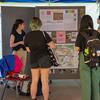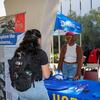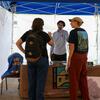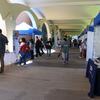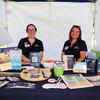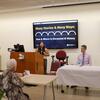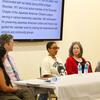Search
Search
Diversifying the Digital livestream broadcast
On Friday, Oct. 20, the UCR Library will broadcast Forum Four of Diversifying the Digital series, titled: “Integration: Why and How to Address Integration with National Digital Collections Initiatives.”
The forum will discuss how to integrate community archives into a nationwide digital platform and the importance of including diverse communities’ voices in our recordkeeping while respecting cultural protocols, traditional practices, and local conditions governing the collection, preservation, and access to community archives materials.
Those interested can watch the livestream broadcast in Rivera Library, Room 403 from 7:30 am to 1:00 pm, and join the conversation on Twitter using the hashtag #DDHR4. Forum presenters will include representatives from funding agencies, national digital collections initiatives, traditional libraries and archives, and community archives.
Diversifying the Digital is a collaboration between the Inland Empire Memories project at UC Riverside, the Amistad Research Center at Tulane University, the Shorefront Legacy Center, the South Asian American Digital Archive, and Mukurtu. The project was funded by the Institute of Museum and Library Services’ (IMLS) National Forum Grants program.
The project aims to address the lack of diversity represented in collections; to develop sustainable networks of community archives resources, programming and collections access at local, regional, and national levels; and to design strategies for increased collaboration with inclusion in national digital initiatives, such as the National Digital Platform.
Diversifying the Digital has hosted three prior forums to facilitate public conversations about collaborative community archives and the composition of our cultural heritage, including digital records. Forum Four will be the last in the series.
“Community archives are traditionally independent entities developed to serve specific communities. They grew out of necessity because of exclusion,” explained Bergis Jules, Project Director for Inland Empire Memories. “Diversifying the Digital has been a tremendous opportunity to explore how we can integrate community archives into national digital collections, organizations, and projects while honoring the individuality and independence of those spaces.”
Funding agencies such as IMLS, the National Endowment for the Humanities, and the Andrew W. Mellon Foundation are moving toward more collaborative approaches to providing access to digital records, as are national digital cultural heritage projects like DPLA and the HathiTrust, which makes this an ideal time for community archives to determine how best to integrate their work with these efforts.
Records for the first three forums are posted on the Diversifying the Digital website, and can be found on Twitter using the hashtags #DDHR1, #DDHR2 and #DDHR3, respectively.
Special Collections & University Archives Collection Development Strategies
As described on our Collections page, the Special Collections & University Archives department of the UCR Library has several large collecting areas: Special Collections, University Archives, the Eaton Collection of Science Fiction and Fantasy, and the Water Resources Collections and Archives. Each of these four areas are separately defined collections with their own research and instructional strengths, topics and materials of historical collecting, and areas targeted for future growth and development.
Special Collections & University Archives Reading Room Policy
This policy ensures the security and preservation of materials held at Special Collections & University Archives.
SCUA Unprocessed Collections Policy
Unprocessed Manuscript and Water Resources collections are generally open for research use, provided they are not restricted. However, the Special Collections and Archives staff may need to delay access for a reasonable period of time to survey the records for confidential information and/or personally identifiable information. Therefore all requests for unprocessed materials must be made at least 72 hours in advance of visiting the archives.
Water Resources Collections & Archives
Located in: Orbach Science Library, Special Collections & University Archives
The Water Resources Collections & Archives (WRCA) acquires, preserves, and provides access to materials that document water-related issues throughout the United States and beyond, with a particular emphasis on issues affecting the state of California.
New Resource Acquisitions: Spring 2019
The UCR Library is pleased to announce the acquisition of several new online databases, archives, reference works, and more.
These new resources, selected by librarians in the Collection Strategies Department, will enhance the library’s existing distinctive collections, support emerging areas of research at UCR, and provide access to valuable research and teaching resources.
These new resources include:
PrepSTEP by Learning Express
PrepSTEP is an online collection of test preparation materials, including practice exams, assessment quizzes, and skill-building exercises. Tests covered include the GRE, MCAT, LSAT, CSET, and more.
ProQuest Historical Newspapers
- Los Angeles Sentinel, 1934-2005
- Baltimore Afro-American, 1893-1988
- New York Amsterdam News, 1922-1993
Archives of Sexuality and Gender
The library now has access to the complete Archives of Sexuality and Gender collection, which includes primary sources for the historical study of sex, sexuality, and gender.
- Parts 1-2: LGBTQ History and Culture Since 1940
- Part 3: Sex and Sexuality, Sixteenth to Twentieth Century
Sabin Americana, 1500-1926
This digital collection, drawn from Joseph Sabin's famed bibliography, Bibliotheca Americana: A Dictionary of Books Relating to America from Its Discovery to the Present Time, features a collection of more than 29,000 books, pamphlets, serials, and other documents
American Historical Periodicals Collection Part 6
This sixth collection of historical periodicals from the American Antiquarian Society was added by the library in addition to Sets 1-5. The entire collection is now available on the Gale Primary Sources platform, and is cross-searchable with other Gale primary sources. The collection includes unusual and short-lived magazines as well as better-known titles with long runs, covering the colonial period through the twentieth century.
Garland Encyclopedia of World Music
This comprehensive online reference source for world music features more than 9,000 pages of materials and 300 audio recordings. The encyclopedia also includes musical illustrations, photographs, drawings, song texts, score examples, charts, and maps.
Eighteenth Century Collections Online, Part II
This database expands on the library’s access to Eighteenth Century Collections Online, Part I. The complete collection consists of every significant English-language and foreign-language title printed in the United Kingdom during the eighteenth century, as well as thousands of important works from the Americas. Materials in the collection include books, pamphlets, sermons, sheet music, and more.
Archives Unbound African Collection
This library has purchased the Archives Unbound African American Collection, which includes 13 discrete collections of primary source materials. Selected titles include:
- Ralph J. Bunche Oral Histories Collection on the Civil Rights Movement
- Fannie Lou Hamer: Papers of a Civil Rights Activist, Political Activist, and Woman
- Rastafari Ephemeral Publications from the Written Rastafari Archives Project
- James Meredith, J. Edgar Hoover, and the Integration of the University of Mississippi
For a full list of collections included Archives Unbound, please click here.
New Resource Acquisitions: Winter 2020
The UCR Library is pleased to announce the acquisition of several new online databases, archives, reference works, and more.
These new resources, selected by librarians in the Collection Strategies Department, will enhance the library’s existing distinctive collections, support emerging areas of research at UCR, and provide access to valuable research and teaching resources.
The new resources include:
New Sections of JoVE: The Journal of Visualized Experiments
JoVE is a video journal platform featuring videos that teach fundamental concepts and techniques for the lab. Via JoVE, researchers and students can view the intricate details of cutting-edge experiments rather than read them in text articles. The UCR Library has added two collections to our JoVE offerings: JoVe Science Education Chemistry & Advanced Biology and JoVE Immunology and Infection.
Henry Stewart Talks: Biomedical & Life Sciences Collection
HSTalks provides specially prepared, animated, online, audio-visual lectures, seminar-style talks and case studies. Editors and lecturers are leading world experts and practitioners, including Nobel Laureates, drawn from academia, research institutes, commerce, industry, the professions and government.
UK National Archives, Collections CO1 and CO5
This collection, available on the ProQuest platform, includes Collection CO 1 from The UK National Archives, officially titled Privy Council and related bodies: America and West Indies, Colonial Papers and the Calendar of State Papers, Colonial: North America and the West Indies 1574-1739.
Colonial America: Complete CO5 Files from UK National Archives, 1600-1822
Colonial America, via the Adam Matthew Platform, makes available all 1,450 volumes of the CO 5 series from The National Archives, UK, covering the period 1606 to 1822. CO 5 consists of the original correspondence between the British government and the governments of the American colonies, making it a uniquely rich resource for all historians of the period. The UCR Library has access to Module I: Early Settlement, Expansion and Rivalries, and Module II: Towards Revolution. For more information on these modules, see http://www.colonialamerica.amdigital.co.uk/Introduction/NatureAndScope.
Ethnomusicology: Global Field Recordings
This diverse and comprehensive collection focuses on the cultural study of music and explores content from across the globe. Produced in collaboration with the UCLA Ethnomusicology Archive, the material in this collection includes thousands of audio field recordings and interviews, educational recordings, film footage, field notebooks, slides, correspondence and ephemera from over 60 fields of study.
American Indian Newspapers
From historic pressings to contemporary periodicals, American Indian Newspapers contains nearly 200 years of Indigenous print journalism from the United States and Canada. With newspapers representing a huge variety in publisher, audience and era, this resource allows researchers to discover how events were reported by and for Indigenous communities.
American Indian Newspapers was developed with, and has only been made possible by, the permission and contribution of the newspaper publishers and Tribal Councils concerned.
New Subjects from Oxford Bibliographies Online
The UCR Library has added six new topical areas to our Oxford Bibliographies Online collection:
- African American Studies
- Atlantic History
- Buddhism
- Environmental Science
- Philosophy
- Sociology
Oxford Bibliographies are developed cooperatively with scholars and librarians worldwide, and offer exclusive, authoritative research guides across a variety of subject areas. The Oxford Bibliographies combine the best features of an annotated bibliography and a high-level encyclopedia and direct researchers to the best available scholarship in a given subject. The UCR Library also has access to the following Oxford Bibliographies: Anthropology, Art History, Chinese Studies, Education, Evolutionary Biology, Latin American Studies, Latinx Studies, Music, Psychology, and Public Health.
Making Archives Modern: Spotlight on Eric Milenkiewicz
The Society of California Archivists (SCA) recently elected UCR Library’s Eric Milenkiewicz as Vice President / President Elect.
Formed in 1971, SCA is a professional association devoted to the support and development of individuals and institutions that collect, care for, and provide access to the documentary heritage of California and adjoining areas.
As the VP / President Elect, Milenkiewicz will have a hand in the programming for the SCA’s 2019 Annual General Meeting, which draws several hundred archivists from across the state. He will also be involved in planning the 2020 Western Roundup in San Francisco, where attendees from four regional archivist associations in the west converge.
Milenkiewicz first started working in the library as a student employee. After graduation (class of 1999), and while earning his MLIS degree from San Jose State, he worked in a variety of positions, mostly in Special Collections & University Archives.
His current role as Digitization Services Program Manager complements his primary passion in library work, archives. With his knowledge of digitization, he sees serving as the VP / President Elect of SCA as an opportunity to get the archival community thinking differently about how they work.
“Today’s archivists possess skillsets that can be applied to many other areas of the library, and even to other industries,” Milenkiewicz said. “In addition to the traditional archival work, many of us code, work with advanced imaging equipment, and manage digital assets. These technical skills can open up many other avenues and job opportunities for us.”
He added, “Much of the information we interact with today is in digital form, but a lot of historical information is still only available in print. Taking this material and digitizing it opens it up to a whole new audience that probably didn’t even know it existed.”
Milenkiewicz values how new technologies can empower underrepresented communities to create and maintain their own digital archives. In 2017, he wrote a grant proposal which was funded by the Andrew W. Mellon Foundation that enabled the UCR Library to work with the Sherman Indian Museum to digitize their collections.
“Honestly, looking back on my career thus far, that’s probably my greatest accomplishment,” he explained. “The Museum receives virtually zero funding and has operated for more than 40 years primarily as a result of the passionate volunteers in their community. They needed funds to help preserve their collection and thankfully we received the financial support to do that digitally.”
Milenkiewicz was initially drawn to archives because of his passion for history. “What I find most fulfilling is being able to surface hidden or untold stories so that people can learn their history, learn their culture,” he explained. “Now, instead of merely trying to provide access to the physical materials, it’s also about digitizing it. Making sure this material is preserved, it’s safeguarded, it’s accessible for people to find and use.”
From Student Assistant to Princeton University Processing Archivist

As a UCR student majoring in history, Enid Ocegueda’s path to becoming an archivist started unexpectedly — with a class assignment.
While conducting original research for a World War I history course, she explored the archives for the first time and discovered a collection of propaganda posters. This prompted her to write about propaganda methods aimed at women, which was later published in UCR’s Undergraduate Research Journal. The experience further sparked her interest in archival work and set her on a path that would lead her to work in the archives.
During her time at UCR, Enid worked as a student assistant in the library’s administrative office in 2015-2016. Though her role primarily involved administrative tasks, her supervisor, Executive Assistant to the University Librarian Terri Gutierrez, recognized her dedication and encouraged her growing interest in archives and librarianship. Inspired, Enid pursued various internships as a student. Her first internship at the California Museum of Photography gave her her first hands-on experience in archival work.
“I realized then how much I enjoyed working with historical materials,” Enid recalls. “That internship solidified my interest in archives.” She later pursued an internship with the National Archives in Perris, CA, and then ventured to the east coast through the UCDC program and worked as a Collections Intern for the Belmont-Paul Women’s Equality National Monument.
Determined to build her career in the field, Enid completed her master’s degree in Library and Information Science at San Jose State University. From there, she gained experience working at Stanford University’s Hoover Institution, followed by a corporate librarian role at Edwards Lifesciences, before returning to Stanford as a Project Archivist for the University Archives.
Now, Enid is preparing to start her new role at Princeton University as the Processing Archivist for the Latin American Manuscripts Collections — a position that aligns with her passion for preserving diverse voices in archival spaces.
“I’m excited about this role because it’s dedicated to Latin American collections,” she explains. “That’s rare in this field, and it’s a chance to focus on ensuring those voices are preserved and made accessible.”
Enid’s passion for this work stems from her realization that Latin American stories are often missing from archives. “I didn’t see many collections that reflected my background,” she says. “That motivated me to become part of the solution — to bring those voices into the archives.”
Reflecting on her journey, Enid encourages students interested in library or archival careers to embrace every opportunity.
“Put yourself out there,” she advises. “Even if you’re not sure where your path is heading, taking on different roles and being open to new experiences can help you find what you’re passionate about.”
As she prepares for this next chapter at Princeton, Enid is excited to focus on connecting researchers with Latin American collections and ensuring these important materials are preserved for future generations.

